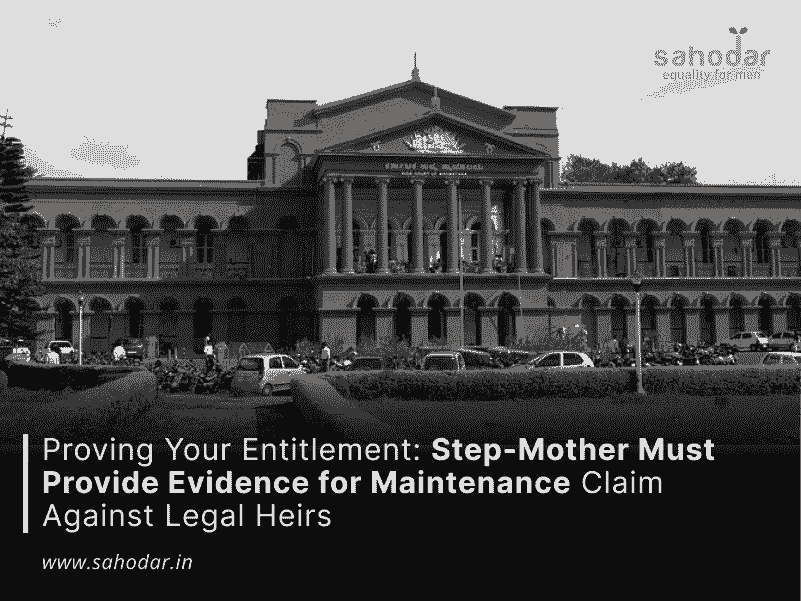Justice K Natarajan of the Karnataka High Court, has ruled that a stepmother seeking maintenance from the legal heirs of her deceased husband must provide evidence and submit relevant documents to prove her entitlement before the family court. The judgment was handed down in response to a petition filed by Khaleel Ul-Rehman, which sought to modify a family court order granting Rs 25,000 per month in maintenance to their stepmother.
In response to a petition filed by Khaleel Ul-Rehman, the Karnataka High Court has ruled that the interim maintenance granted by the family court to their stepmother is unsustainable. The court has directed the stepmother to provide evidence and relevant documents to prove her husband’s ownership of properties and income.
In the meantime, the stepmother is entitled to Rs.10,000 per month until the case is disposed of by the trial court. The family court is instructed to record the evidence of both parties and make a decision in accordance with the law, taking into account the Senior Citizen Act and Section 125 of the Cr.P.C., as well as relevant judgments of the Supreme Court and this Court.
The petitioners in this case have challenged the order of the family court that granted their stepmother Rs.25,000 per month in maintenance. The stepmother claimed before the family court that she had married the father of the petitioners after the death of his first wife. Her husband had assured her before their marriage that he had both landed and movable properties, and that he would take care of her. She lived with her husband in a joint family until his death on 30.08.1994. The current petitioners are the children of Moheddin Muniri, the stepmother’s deceased husband and successor.
The order of the family court granting Rs.25,000 per month in maintenance to the petitioners’ stepmother has been challenged in court. The stepmother had married the father of the petitioners after the death of his first wife, who was assured by her husband that he had both movable and landed properties and would provide for her. She lived with her husband in a joint family until his death on 30.08.1994. The present petitioners are the children of Moheddin Muniri, the stepmother’s late husband and successor.
The petitioners argued that the respondent, being their stepmother, is not eligible for maintenance under Section 125 of the Cr.P.C.
After examining the records and reviewing Section 125 of the Cr.P.C, the bench concluded that stepmothers are not covered under the definition and therefore cannot seek maintenance from their stepchildren. Additionally, the bench noted that the respondent in this case had filed the petition under the Special Maintenance and Welfare of Parents and Senior Citizens Act 2007, which allows for a maximum maintenance payment of Rs.10,000. However, the respondent had allegedly suppressed important facts and misled the court, and should have approached the Deputy Commissioner for relief under this Act.
The court noted that under Section 9(2) of the Senior Citizens Act, the maximum limit for granting maintenance was Rs.10,000, and that the Act defines parents to include stepfathers and stepmothers. On the other hand, Section 125 of the Cr.P.C does not define stepmothers, and they are not covered under the definition of mother. Therefore, the court observed that the petitioner must approach the tribunal under the Senior Citizens Act for claiming maintenance as it covers stepmothers in its definition.
The court took note of a previous ruling by a coordinating bench in the Ulleppa and Ors Vs Smt. Gangabai case, which stated that a stepmother can claim maintenance from her husband’s property income if she is unable to support herself. However, in the present case, the court found that the order granting Rs. 25,000 as interim maintenance by the family court was not sustainable, and further evidence and documents needed to be submitted by the stepmother to demonstrate her husband’s properties and income.
Additionally, the bench noted that the respondent was receiving a rental income of Rs.4,000, but she also had a divorced daughter and granddaughter to support. Thus, the bench recommended that the respondent should raise this issue in the Family Court and also pursue maintenance under the Senior Citizen Act.
In conclusion, the bench held that the order of the Family Court granting interim maintenance of Rs.25,000 to the respondent was not sustainable. The matter required further evidence and documentation to be presented by the petitioner/stepmother to prove that her husband had significant properties and income. Therefore, the bench set aside and modified the order under challenge.
Source: https://www.livelaw.in/news-updates/karnataka-high-court-section-125-of-crpc-maintenance-to-step-mother-family-court-order-source-of-income-224016

